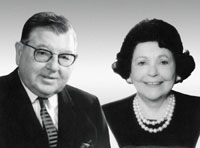The University of Texas Southwestern Medical Center at Dallas
For two decades, the legacy of Dallas oilman Wofford Cain and his wife, Effie Marie, has played a major role in research conducted at UT Southwestern Medical Center.
Their support has funded cutting-edge research and clinical care in diverse fields through the Cain Foundation. The private family foundation primarily funds universities and medical schools in Texas, along with public charities and civic organizations.
Throughout their lives, the Cains were great supporters of higher education and of medical research, said Mr. Cain's nephew, Austin attorney Frank Wofford Denius, who is foundation president. "It's only natural that he had a trend of helping UT Southwestern."
Mr. Cain was a co-founder of Southern Union Co. When the couple became ill late in their lives, they were treated at UT Southwestern. Mr. Cain died in 1977, and Mrs. Cain in 1999.
Their legacy continues at UT Southwestern in multiple clinical and research areas. The foundation's most recent gift is the Cain/Denius Comprehensive Center in Mobility Research, which will fund clinical research in areas such as multiple sclerosis, spinal-cord injury and stroke.
The multiple sclerosis program provides comprehensive, interdisciplinary health care for patients and families with MS. In addition, research studies focus on mechanisms that cause the disease.
The spinal-cord injury program's primary purpose is to develop ways to promote nerve repair. The laboratory includes innovative programs involving repetitive training on treadmills to strengthen and retrain damaged neurons and research on regeneration of injured cells.
UT Southwestern's stroke center, one of the most prominent in the nation, includes comprehensive treatment and research programs. Care is provided both in the acute phase of the disease and in long-term rehabilitation; morbidity rates are among the lowest in the nation.
The foundation's beneficiaries have included:
- Dr. Weichun Lin, the current Cain Foundation Scholar in Medical Research, who is looking at the connection between nerve cells and muscle to understand how nerve cells reach their target muscle during embryonic development.
- Dr. Ege Kavalali, a Cain Foundation Scholar in Medical Research from 1999 to 2003, who studies changes in nerve-cell membranes as they allow the release of neurotransmitters.
- Dr. Frank Gottschalk, holder of the R. Wofford Cain Distinguished Chair in Bone and Joint Disease Research, who directs the Orthopaedic Surgery Clinic.
- Dr. Dan Garwood, holder of the Effie Marie Cain Distinguished Chair in Cancer Therapy Research. He has been a principal developer of the "Accuray CyberKnife," a new generation means of delivering radiation to cancer while minimizing damage to normal tissue.
- Dr. Robert Parkey, holder of the Effie and Wofford Cain Distinguished Chair in Diagnostic Imaging, who is looking for new ways to discover tumors and new models of how bone disease progresses.
The foundation has also established the Effie Marie Cain Alzheimer's Research Center, the Effie Marie Cain Distinguished Chair in Alzheimer's Research and the Effie Marie and Wofford Cain Endowed Clinical Research Program, which support the laboratory and clinical work of Dr. Thomas Südhof and Dr. Myron Weiner, and the Effie Marie Cain Research Scholar Fund, which underwrites research by Dr. Philip Thorpe and Dr. Rolf Brekken on the role of angiogenesis in cancer. These endowments are invested in the Long Term Fund.
 |  |
| Wofford and Effie Marie Cain |
In addition, the foundation provided funds for UT Southwestern's Effie and Wofford Cain Conference Center.
|






